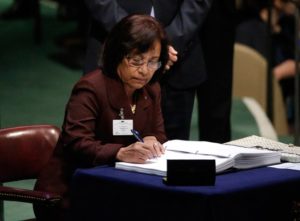In a move at the critical once-a-decade United Nations’ 4th International Conference on Small Island Developing States (SIDS4), holding from May 27 to 30, 2024, in Antigua and Barbuda, the Republic of the Marshall Islands (RMI) officially endorsed the Fossil Fuel Non-Proliferation Treaty initiative.

The decision makes RMI the 13th nation to join the growing coalition of climate-progressive countries leading the effort to secure a negotiating mandate for a Treaty and reinforces the island nation’s place at the forefront of the fight against climate change, and in defense of human rights.
Dr. Hilda Heine, President of the Republic of the Marshall Islands, said at the opening plenary of the summit: “Fossil fuels are at the heart of the planetary crisis that we face today. My country is resilient – war, colonialism and nuclear testing have marked our history. We know the dangers that fossil fuels pose, and the absolute necessity of addressing them as the urgent threat they are. We are proud to join the ranks of the countries supporting the Fossil Fuel Non-Proliferation Treaty initiative today.”
The Fossil Fuel Treaty aims to halt the expansion of fossil fuels and pave the way for an equitable clean energy transition. RMI, highly vulnerable to the climate crisis, understands the urgency of preventing the further development and use of fossil fuels. With a small landmass (181 sq km) averaging just two meters above sea-level and a population of 42,418, all of RMI’s territory is imminently threatened by rising sea levels, ocean acidification, and extreme weather. A one-meter rise could inundate 40% of their capital and largest city, Majuro.
Sir Molwyn Joseph, Minister of Health, Wellness & The Environment of Antigua and Barbuda, said: “I believe it’s extremely important for small island developing states to act in solidarity on this very issue. We have to become one in protecting ourselves. We cannot rely on large economies, and we cannot rely on those who are responsible for the proliferation of fossil fuels that is causing global warming and the devastation to the island states. And so, the endorsement of Marshall Islands was a welcome declaration today. And as a Minister in the Caribbean region, I’m hoping to be able to persuade all Caribbean islands to be part of this coalition.”
Susana Muhamad, Minister of Environment and Sustainable Development of Colombia, said: “Marshall Islands has historically been a leader in the climate negotiations. It has been a leader in establishing clearly their reality of climate change, through showing the situation that small islands will experience in the future, and the risk that it creates for their countries and their civilisation. So, I’m very happy that we can count on the leadership of Marshall Islands to push forward towards something that is very challenging, which is actually getting to the negotiation of a binding Fossil Fuel Non-Proliferation Treaty that allows us to plan a transition that is coherent with social justice.”
Selina Leem, Micronesia Lead for the Fossil Fuel Non-Proliferation Treaty Initiative, said: “As one of the frontline countries in the climate crisis, Marshall Islands is familiar with weathering the brunt of an impact. And we will only meet these challenges and rise to the occasion. We must meet the severity of the climate crisis with an even greater level of resolve, as we did in COP21’s 1.5C red line and by now endorsing the Fossil Fuel Non-Proliferation Treaty to make sure this is a reality. Our ambitious trajectory is not an option but a necessity. Not just for our futures, but our very present. Thank you for your continued progressive leadership in the climate space.”
In the lead-up to SIDS4, the Fossil Fuel Non-Proliferation Treaty Initiative convened on Sunday, May 26th in Antigua and Barbuda, the first meeting of the endorsing nations leading an effort to secure a negotiating mandate for a Treaty. The meeting was hosted by the SIDS4 host nation, Antigua and Barbuda, the first Caribbean country to endorse the Treaty, in collaboration with the Governments of Tuvalu and Vanuatu.
The growing coalition of now 13 countries – Vanuatu, Tuvalu, Tonga, Fiji, the Solomon Islands, Niue, Antigua and Barbuda, Timor-Leste, Palau, Colombia, Samoa, Nauru, and the Marshall Islands – is urging other governments to join them in seeking a mandate to negotiate a new Treaty on fossil fuels. The proposed Treaty is a new legal mechanism that will secure an equitable transition away from oil, gas, and coal, and the world’s chance to stay within the 1.5°C climate limit.
The SIDS4 conference is a global event dedicated to tackling the distinct vulnerabilities and challenges of small island states, fostering sustainable development through international collaboration, strengthening resilience against the climate crisis, and advancing economic, social, and environmental progress. The summit serves as a crucial platform for island nations to advocate for ambitious climate action on a global scale set against an escalating planetary crisis of climate breakdown, associated with pollution and biodiversity loss.
SIDS are particularly impacted by fossil fuels and their dependency on them, facing rising sea levels, increased extreme weather events, and economic instability due to fluctuating energy prices. As some examples, the Solomon Islands have seen severe coastal erosion, while Fiji has experienced devastating cyclones exacerbated by climate change, and islands across the Caribbean continue to be ravaged by more frequent and more intense hurricanes.
With the accession of Marshall Islands, the Fossil Fuel Treaty proposal has 12 out of the 39 SIDS nations on board. Notably, the Republic of Colombia, a major developing nation and coal and gas producer, also joined the movement at COP28. This growing international support, which now includes 13 countries, over 100 cities, more than 2,000 civil society organisations, and half a million individuals, seems to underscore the global need to phase out fossil fuels and embrace clean energy solutions, particularly for vulnerable nations like SIDS and the RMI.
